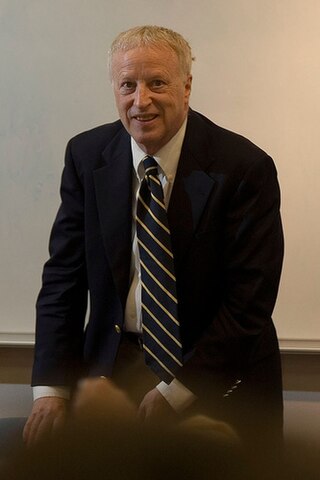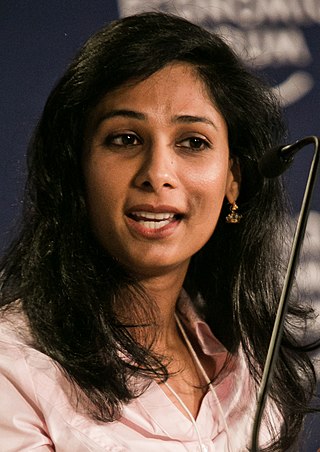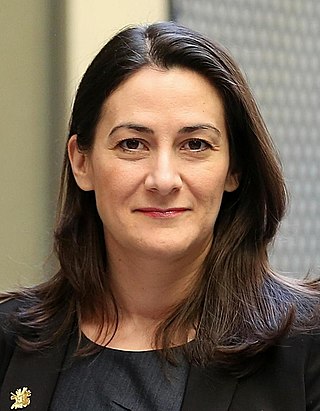The Austrian School is a heterodox school of economic thought that advocates strict adherence to methodological individualism, the concept that social phenomena result exclusively from the motivations and actions of individuals. Austrian school theorists hold that economic theory should be exclusively derived from basic principles of human action.

Post-Keynesian economics is a school of economic thought with its origins in The General Theory of John Maynard Keynes, with subsequent development influenced to a large degree by Michał Kalecki, Joan Robinson, Nicholas Kaldor, Sidney Weintraub, Paul Davidson, Piero Sraffa and Jan Kregel. Historian Robert Skidelsky argues that the post-Keynesian school has remained closest to the spirit of Keynes' original work. It is a heterodox approach to economics.
Rüdiger Dornbusch was a German economist who worked in the United States for most of his career.

George Arthur Akerlof is an American economist and a university professor at the McCourt School of Public Policy at Georgetown University and Koshland Professor of Economics Emeritus at the University of California, Berkeley. Akerlof was awarded the 2001 Nobel Memorial Prize in Economic Sciences, jointly with Michael Spence and Joseph Stiglitz, "for their analyses of markets with asymmetric information."

Ludwig Maurits Lachmann was a German economist, economic theorist and important contributor to the Austrian School of Economics. Lachmann, Israel Kirzner, and Murray Rothbard were the three primary catalysts of the Austrian 'revival', beginning in 1974. He wrote on economic theory, history, and methodology, as well as on the application of Hermeneutics to economic thought, in order to interpret economic phenomena.

Jan A. Kregel is an American post-Keynesian economist.

Edward Christian Prescott was an American economist. He received the Nobel Memorial Prize in Economics in 2004, sharing the award with Finn E. Kydland, "for their contributions to dynamic macroeconomics: the time consistency of economic policy and the driving forces behind business cycles". This research was primarily conducted while both Kydland and Prescott were affiliated with the Graduate School of Industrial Administration at Carnegie Mellon University. According to the IDEAS/RePEc rankings, he was the 19th most widely cited economist in the world in 2013. In August 2014, Prescott was appointed an Adjunct Distinguished Economic Professor at the Australian National University (ANU) in Canberra, Australia. Prescott died of cancer on November 6, 2022, at the age of 81.

William Jack Baumol was an American economist. He was a professor of economics at New York University, Academic Director of the Berkley Center for Entrepreneurship and Innovation, and Professor Emeritus at Princeton University. He was a prolific author of more than eighty books and several hundred journal articles. He is the namesake of the Baumol effect.

Lars Peter Hansen is an American economist. He is the David Rockefeller Distinguished Service Professor in Economics, Statistics, and the Booth School of Business, at the University of Chicago and a 2013 recipient of the Nobel Memorial Prize in Economics.

Timothy Jerome Kehoe is an American economist and professor at the University of Minnesota. His area of specialty is macroeconomics and international economics.

Mihir Rakshit is an Indian economist, known for his work on fiscal, monetary and other policy, especially issues that concern developing economies. Originally from Chittagong, which is now in Bangladesh, he did his graduation from Presidency College, Calcutta and post-graduation from the University of Calcutta. He taught at the departments of Economics of The University of Calcutta, The University of Burdwan, Presidency College Calcutta, and Indian Statistical Institute Calcutta, as faculty. He also taught at Delhi School of Economics and Erasmus University Rotterdam, as visiting faculty. He served the Reserve Bank of India for two terms as a member of its central board of Directors. He was Editor-in-chief of the open access quarterly journal Money and Finance published by ICRA Limited from 1997 to July 2016.
Axel Leijonhufvud was a Swedish economist and professor emeritus at the University of California, Los Angeles (UCLA), and professor at the University of Trento, Italy. Leijonhufvud focused his studies on macroeconomic monetary theory. In his defining book On Keynesian Economics and the Economics of Keynes (1968) he focuses on a critique of the interpretation of Keynesian economic theory by Keynesian economists. He goes on to call the standard neoclassical synthesis interpretation of the Keynes' General Theory as having misunderstood and misinterpreted Keynes. In one of his papers, "Life Among the Econ" (1973), he takes a comical yet critical look at the inherent clannish nature of economists; the paper was considered a devastating takedown of economics and economists.
Partha Sen is an Indian professor of economics, associated with the Delhi School of Economics. His research interests are International Trade, Macroeconomic Theory, and International Finance.

Gita Gopinath is an Indian-American economist who has served as the first deputy managing director of the International Monetary Fund (IMF), since 21 January 2022. She had previously served as chief economist of the IMF between 2019 and 2022.
Monika Piazzesi received her PhD in economics at Stanford University. She was a recipient of the Deutsche Studienstiftung ERP (1997-2000). She has been the Joan Kenney Professor of Economics at Stanford University since 2010. She is also a senior fellow at the Stanford Institute for Economic Policy Research. In 2005, when she was an assistant professor at the University of Chicago Business School, she received the Germán Bernácer Prize. She subsequently won the Elaine Bennett Research Prize. Her research focuses on asset pricing and time series econometrics, especially related to bond markets and the term structure of interest rates. She has published papers related to housing issues, asset prices and quantities, bond markets, interest rate and GDP. In 2023, she was elected to the National Academy of Sciences.

Larry Randall Wray is a professor of Economics at Bard College and Senior Scholar at the Levy Economics Institute. Previously, he was a professor at the University of Missouri–Kansas City in Kansas City, Missouri, USA, whose faculty he joined in August 1999, and a professor at the University of Denver, where he served from 1987 to 1999. He has served as a visiting professor at the University of Rome, Italy, the University of Paris, France, and the UNAM, in Mexico City. From 1994 to 1995 he was a Fulbright Scholar at the University of Bologna. From 2015 he is a Visiting professor at the University of Bergamo, located in Italy. He was a visiting professor at Masaryk University in the Czech Republic.

Pavlina R. Tcherneva is an American economist, of Bulgarian descent, working as associate professor of economics at Bard College. She is also a research associate at the Levy Economics Institute and expert at the Institute for New Economic Thinking.
Joseph Zeira is an Israeli economist. His main work is in macroeconomics, in economic growth and in the economy of Israel. He is the Aaron and Michael Chilewich Professor of Economics at the Hebrew University of Jerusalem.
Roger Edward Alfred Farmer is a British/American economist. He is currently a professor at the University of Warwick and is a Distinguished Emeritus Professor and former Chair of the Economics department at the University of California, Los Angeles. He has also held positions at the University of Pennsylvania, the European University Institute and the University of Toronto. He is a Fellow of the Econometric Society, Research Associate of the National Bureau of Economic Research, and Research Fellow of the Centre for Economic Policy Research, and the former Research Director of the National Institute of Economic and Social Research (NIESR). In 2013, he was the Senior Houblon-Norman Fellow at the Bank of England. He is internationally recognized for his work on self-fulfilling prophecies. Farmer has published several scholarly articles in leading academic journals. He is also a co-founder of the Indeterminacy School in Macroeconomics. His body of work has advanced the view that beliefs are a new fundamental in economics that have the same methodological status as preferences, technology, and endowments. In his 1993 book, Macroeconomics of Self-fulfilling Prophecies, he argues that beliefs should be modeled with the introduction of a Belief Function, which explains how people form ideas about the future based on things they have seen in the past. In his 2010 book, Expectations, Employment and Prices, he suggests an alternative paradigm to New Keynesian economics which reintroduces a central idea from John Maynard Keynes' The General Theory of Employment, Interest and Money; that high involuntary unemployment can persist as a permanent equilibrium outcome. He provided an accessible introduction to these ideas in his 2010 book How the Economy Works, and more recently, in his 2016 book Prosperity for All, both of which were written for a general audience. The Farmer Monetary Model has different and high policy implications and relevance. Farmer's policy proposal to achieve full employment by controlling and stabilizing asset prices shows promise as a way to help prevent stock market crashes and deep recessions. His son is the economist Leland Edward Farmer, who joined the faculty at the University of Virginia in July 2017.
Sudhakar Rao Aiyagari was an Indian-born economics professor at the University of Rochester. He had previous been a leading research economist at the Minneapolis Fed, prior to which he had taught, in the 1980s, at New York University, University of Wisconsin, Madison, and Carnegie-Mellon University in Pittsburgh.












